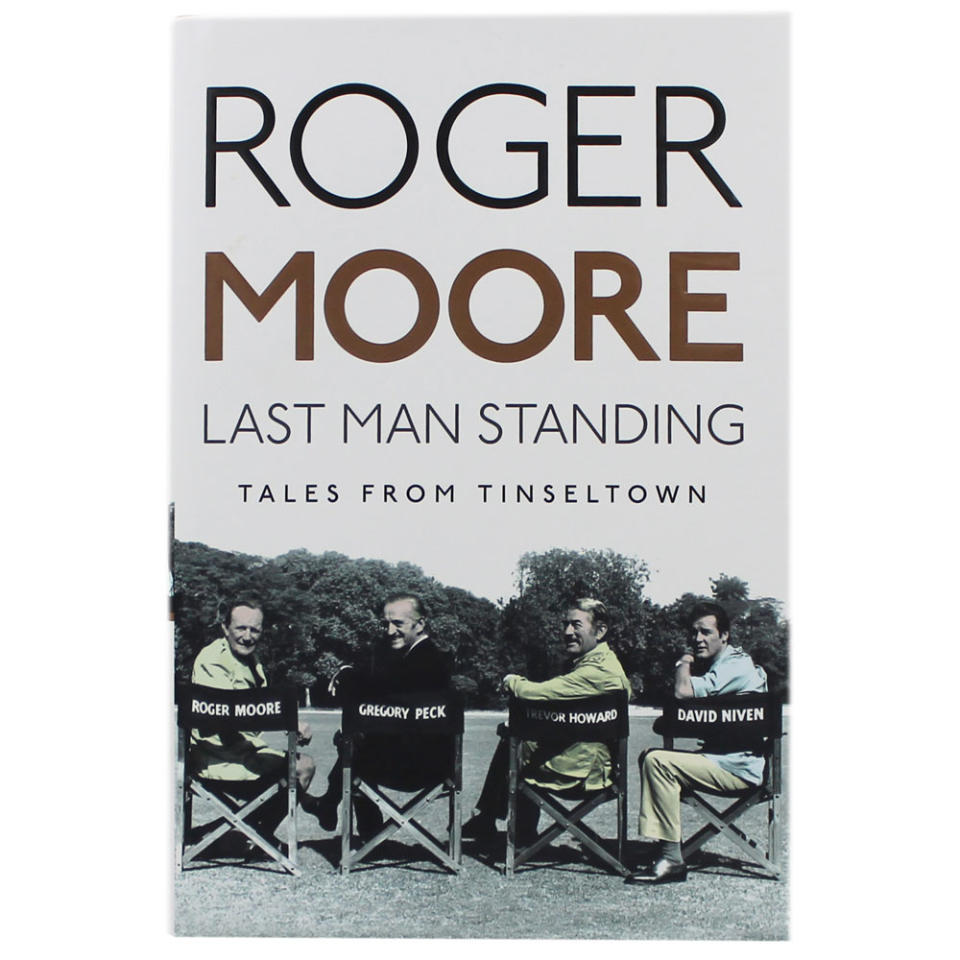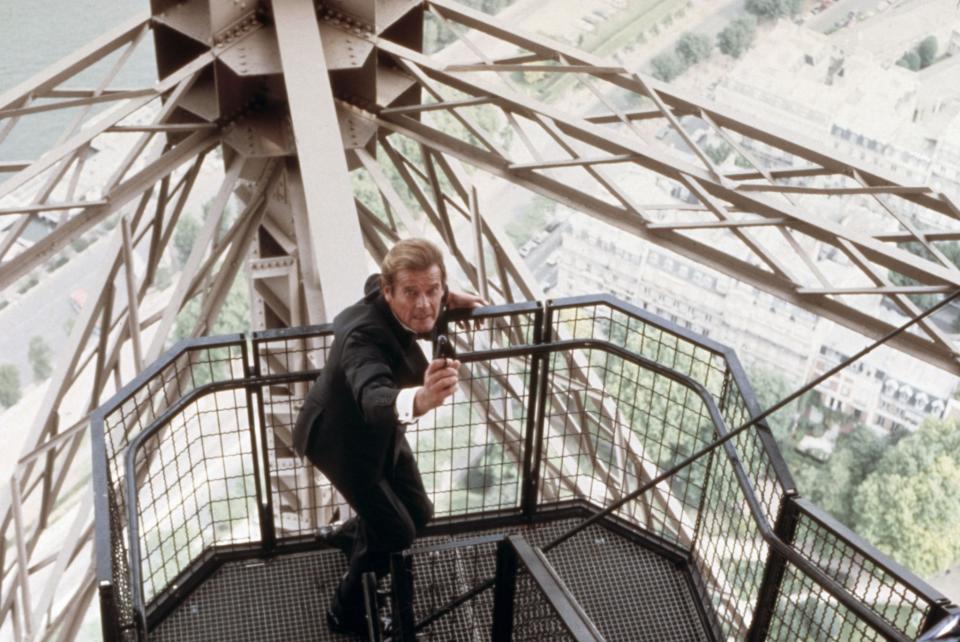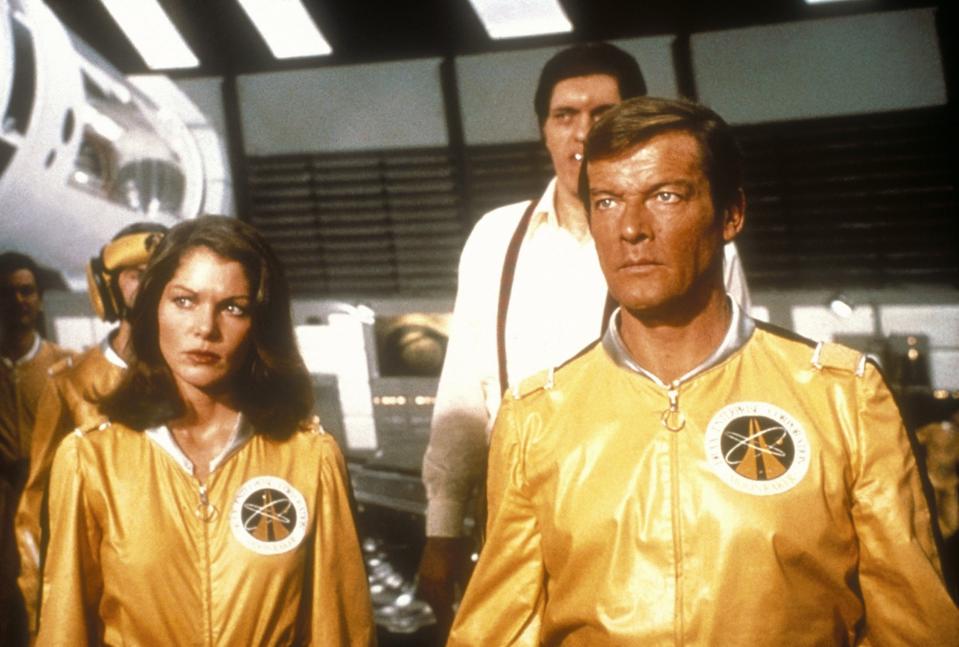Sir Roger Moore interview: 'I don’t want to be remembered, I’m not planning on going'

Sir Roger Moore has sadly died aged 89 after a brief battle with cancer. In celebration of his life and career we’re republishing an interview with great actor from the archives.
Yahoo Movies was lucky enough to speak to Sir Roger Moore about his new book ‘Last Man Standing: Tales From Tinseltown’ in 2014.
The book is a treasure trove of trivia and tales from Moore’s life in the movie industry beginning with his MGM deal in the 1950s, right up to his ridiculous cameo in 2002’s ‘Boat Trip’ and beyond.
The great man was on top form when we spoke offering us some hilarious anecdotes and witticisms, all in his wonderful self-deprecating but charming manner.
The interview was given in the week of Richard Kiel’s death, and the seven-time 007 was ready to pay tribute to the actor who played Jaws in two Roger Moore Bond films. We also touched on his legacy as an actor, his clashes with Lee Marvin, and who would play him in a biopic of his life.
Yahoo Movies: Did David Niven ever offer any writing advice?
Sir Roger Moore: No, not about writing. His first two books, ‘The Moon’s A Balloon’ and ‘Bring on the Empty Horses’ had been so successful; he said, “I’m supposed to be writing a novel. Two years ago, they gave me an enormous advance” – and it was enormous – “I haven’t written a bloody word! But I have invested the money very well, so I’m going to give them the money back, and I’ll still have a nice profit!” He was a funny man.

Niven struggled with the writing process – do you too?
Yes. You have to make your memory work and usually it works at 3am in the morning and you wake up and think “I must write that down!” If you don’t wake up and write it down, you’ve forgotten it when you wake up again. Then Gareth will take what I’ve written and put the right full stops in and so on, because I write without any attention to punctuation. Everything sparks off another memory. The only problem is, words often spark off memories of dirty stories, so it’s a continual case of cleaning up the stories.
In the book you mention ‘The Man Who Haunted Himself’ as your best role – is that the one you’d like to be remembered for?
Well, I don’t want to be remembered, because I’m not planning on going. I’m staying! But yes, the film is one of the few occasions that I was allowed to act.
Do you think you were under-rated as an actor?
Oh yes, I am vastly under-rated, and nobody realised how modest I am.
Do you wish you’d been more dark roles that like?
I would love to have been but unfortunately now, just getting up and moving around is “heavy action” for me. I’ve become so lazy.

(Photo: Everett Collection)
There’s a story in the book about a thrifty “Scottish actor” – is that a reference to Sean Connery?
Good lord, no! I would never make a reference to a fellow actor that was still alive.
How is your relationship with Sean Connery?
Oh, absolutely fine. We’ve known one other since before Bond began actually.
According to IMDB, you had a deal on the Bond films that meant you were supplied with unlimited Montecristo cigars – is there any truth in this?
No, of course it’s not true. That’s like insuring your legs or your breasts for £10m, it’s always a load of nonsense.
You were never tempted to insure your eyebrows?
Oh god, I wish I had! They’re falling out!
Another story on IMDB suggests you had a stunt double for running scenes as you felt you had an unusual running style – is that true?
Yes. I always felt I couldn’t run and that stemmed from when I was five years old and my mother entered me in a sports day. I ran in the first race, then they ran the second and third race, but I was still running the first. I still hadn’t arrived at the winning post. But when I got there after the third race and I stood in front of the judge’s stand throughout all the rest, and the medal presentations until they looked at me and gave me a bag of toffees.
I always say now, that you don’t have to win the race to get the bag of toffees. But I felt rather ashamed of that having watched the opening of the Invictus Games last night. I was very moved.
I read another story about how you once got into a fight with Lee Marvin on the set of ‘Shout At The Devil’?
No, I never got into a ruck with him. We had fights in the film, but I’d never have a battle with Lee – he’d win! He was a tough guy, an ex-marine. Really?
He’s quoted as saying “Roger is built like granite”…
[Laughs] Well, we had a hell of a fight on the film, which was beautifully arranged and choreographed, but one of the things was that Lee had a little problem with alcohol. Twice on the film, he went on a bender, and there was a sequence where his daughter on the film has had a baby, and my character was the father. He came in and he was really well gone, and he had this scene where he had to pick up the baby. He wasn’t holding it well and he was shaking, so I thought he was going to drop it. In the reverse shots of me I’m looking worried, and I really was worried. I was petrified he was going to drop this baby.
The baby was screaming but when he took hold of it, it went dead quiet. I think he’d breathed on it, and his breath was 99% pure alcohol.
There was a story recently that ‘Bond 24’ had been rewritten to add humour – are you keen to see a return of the light-hearted Bond film?

(Photo: Everett Collection)
I don’t think there’s time for humour in the ones that I’ve seen with Daniel Craig. He moves so fast and the action is so good, there’s been no time for jokes. I’ve heard that they possibly are inserting a few throwaway lines but I don’t think it matters because he’s just so damned good.
How is your relationship with Barbara Broccoli and Michael G Wilson, do you speak often?
Yes, we were all on this Radio 4 programme for The Reunion last week, which was the last time I spoke with Richard Kiel.
But Bond is a family. The whole making of Bond is, which is why it was such a joy going back every few months to my friends.
When did you hear the news about Richard Kiel?
It came as a hell of shock this morning as I had an email from my assistant Gareth Owen. He’d heard an hour before and I’m still in a state of not quite believing it.

(Photo: Everett Collection)
He was very very good [as an actor]. We didn’t have any dialogue scenes [together] because he didn’t speak until the last line of the movie in the second film [‘Moonraker’], but his reactions and everything else, he was always perfect. He was a gentle giant and the only way to sum him up was that he was a big man with an even bigger heart.
[The producers] wanted [Richard] to see the film with an ordinary audience, and he went in America and he said there was great whooping and hollering when his head came up out of the sea [at the end of ’The Spy Who Loved Me’] and I think there was that reaction everywhere. He was the villain everyone wanted to see return.
He was a well-loved character and he was very well-defined.
Do you still have an office at Pinewood?
Yes, but I’m not there that often. It’s only when I’m in England that I get out there. But the office is there and Gareth is there.
Has JJ Abrams invited you to see the Star Wars set there?
They’ve been there for a year now preparing. They cut off the corridor at the beginning in case anyone took a sneak at the plans or the script, but JJ Abrams is a friend of mine so I wrote to him and told him that we were in a terrible state, as we couldn’t get to the closest toilet to fill our kettle with water. We couldn’t make tea unless we walked a mile to the nearest tap. We then got a pass to get through the door and we promised to avert our eyes and not look at the scripts or anything else.
When you got the Bond role, were you aware of other actors auditioning for the part?
I never auditioned. They just looked around, they knew I worked cheap and that was it.

(Photo: Everett Collection)
What are your abiding memories of going to Hollywood for the first time in 1950s as an MGM player?
Delight. And terror.
Has Hollywood changed much since?
Oh yes. It changed while I was there. It changed very much. That studio system with the contract players has gone. There are no major studios and they don’t have contract players. They don’t groom actors and actresses any more because they don’t belong to the studios, so it’s up to the actors and their agents to get them the right parts and to make sure their careers continue.
And there’s been a British invasion in Hollywood of late…
That’s what they say. It seemed to me that every time there was a villain, he was English, and I suppose that’s because they’re frightened of upsetting the Chinese or the Russians, or the Africans.
Who could play you in a film of your life? Meryl Streep.
RIP Roger Moore 1927-2017
Read more
Moore: Nick Nack was a sex maniac
Moore – The best James Bond

 Yahoo Movies
Yahoo Movies 

